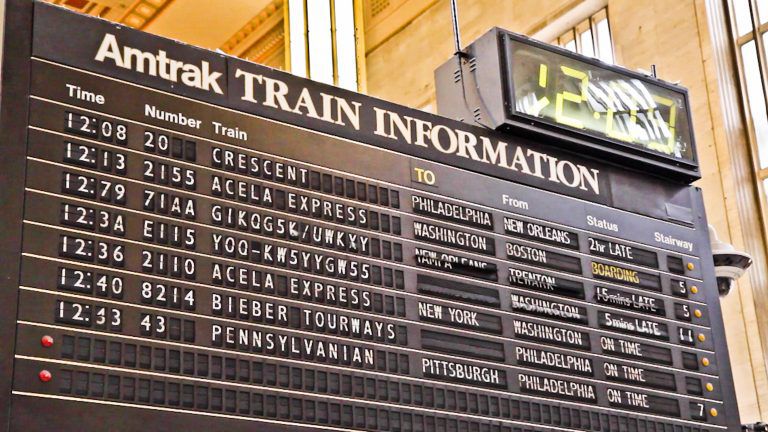Devastation erupted over the loss of 30th Street Station’s “iconic” split-flap departures board, which came down on Jan. 26. Narratives grieved and honored the 1970s installed sign, secondarily mentioning its noncompliance with the Americans with Disabilities Act (ADA) as the primary reason for its dismantlement.
“We needed to implement a digital sign that was ADA-compliant as soon as possible in order to comply with federal regulations, and the disability community made it clear we should not delay any further,” said a representative with Amtrak to Philly Voice.
The sign was unable to meet ADA standards for font and size. In addition, it was not integrated into the train station’s PA system for automated audible announcements or able to include other visible messages.
Given the lack of celebration for a small step for ADA compliance in a town riddled with inaccessibility, this gives pause to how citizens and media outlets will respond to future changes to historic sites. Last month, Philadelphia Weekly profiled the City’s new Director of ADA Compliance Saron McKee who is in the midst of a large-scale data collection of City infrastructure to evaluate federal compliance for people with disabilities.
“Updating public spaces to be ADA compliant is incredibly important and necessary work. I understand people’s feelings of nostalgia for unique and interesting design elements such as the flip board, and in many cases, I think there are ways to both preserve things that are historically significant while also making sure that everyone can access resources,” said McKee to PW. “Soon, the City will embark on an accessibility review of about 500 City structures. After the physical review is completed, our office will engage the public in conversations about how we can be mindful when making changes to spaces.”
McKee furthered explained that the findings and eventual changes that need to be made will also act as a learning opportunity for abled bodies to understand the necessity of these changes for equitable use of city infrastructure.
“We will also use these meetings to engage in a dialogue with the public about why it is vitally important that we make these updates so City services are available for all residents, including people with disabilities,” McKee added.
As the old board makes its way to the Railroad Museum of Pennsylvania in Lancaster County, it is interesting to note the pre-ADA era it came from. In 1976, 14 years before the ADA would be signed into law, the disabled community in Philadelphia won a major victory with Disabled in Action of Pennsylvania, Inc. v. Coleman, also known as the Transbus lawsuit, requiring all buses owned by public transit authorities receiving federal funds to be wheelchair accessible.
In a city known for its historic pride, it’s also important to remember the negatives of what iconic structures and images can represent. For people in the disability community that history includes isolation, forced institutionalization and other forms of discrimination, many of which still take place today.
“I love that flip board; the sound, the history, the excitement I used to get seeing it. I am still hoping that there is a way we can save some of that nostalgia with the new sign. The resistance to the new signage I believe is about retaining history, I understand that. History also states that we should be ADA compliant (ADA Act signed in 1990),”, Director of Disability Pride Philadelphia, Inc. Vicki Landers wrote in correspondence with PW. “We must be inclusive! An ADA complaint sign will allow people with disabilities to travel with independence. Everyone wants their independence, making the world accessible and inclusive is a human right.”
Plans for a new flip-board sign seem to be in the works as Oat Foundry’s prototype of a digitalized, vintage-feel sign came out on social media.
A preview of an Oat Foundry Split Flap Display updating train times and PSAs for 30th Street Station. @6abc @PhillyInquirer @billy_penn @IngaSaffron @FOX29philly @KeeleyFox29 @PhillyDailyNews #30thstreetstation pic.twitter.com/uYc6QQ2VXw
— Oat Foundry (@OatFoundry) January 25, 2019
A small sign of larger changes inevitably to come, more importantly, the flip-board is emblematic of a crossroads: whether this city can prioritize historical importance in the larger landscape of equality.
TWITTER:@ANDREAJCANTOR




